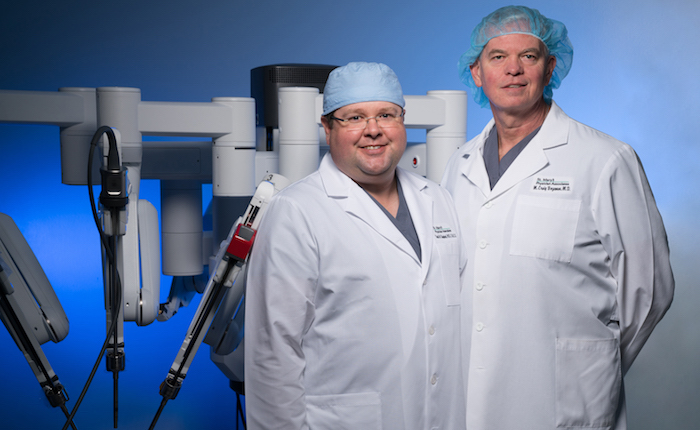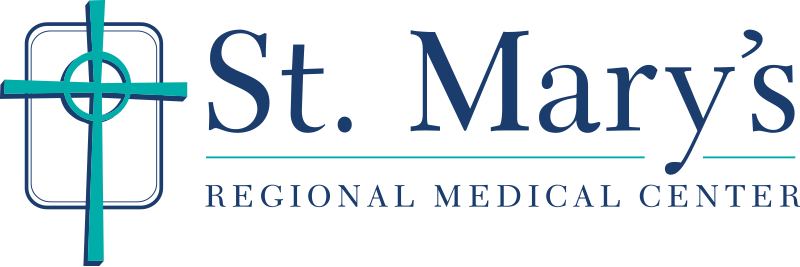Inpatient and Outpatient Surgery
When you or someone in your family needs an inpatient or outpatient surgical procedure, the Surgery Department at St. Mary's Regional Medical Center can help. The department is equipped with advanced technology and we are committed to using techniques that help lower infection rates and encourage faster healing.
Minimally Invasive Surgery
Robotic/laparoscopic or minimally invasive surgical techniques often enable patients to leave the hospital with smaller scars and a faster recovery compared to traditional, open surgery. Other advantages of minimally invasive surgery can include greater surgical precision, fewer complications, reduced pain and discomfort, less trauma, less blood loss, reduced risk of infection and shorter hospital stays. Many of the procedures below may be done using robotic/laparoscopic techniques. Talk to your doctor about whether minimally invasive surgery is right for your procedure and individual situation.
 Common Surgical Procedures
Common Surgical Procedures
Below are some of the common surgical procedures performed at St. Mary's Regional Medical Center:
Appendectomy
An appendectomy is a surgical procedure to remove the appendix. The appendix is removed when it becomes swollen or infected, which is called appendicitis. An infected appendix can burst and leak bacteria into the abdomen. Common symptoms include abdominal pain, fever, nausea, vomiting and diarrhea.
Arthroscopy
Arthroscopy is a minimally invasive procedure used to diagnose and treat problems inside a patient's knee or other joints. During this procedure, surgeons make a small incision in the patient's skin and insert a tiny camera so they can examine the structures inside the joint.
Bowel resection
During bowel resection, all or part of the large or small intestine are removed and the remaining sections are sewn together. The procedure is performed when the intestine become blocked or diseased.
Colon and rectal surgery
Surgeons at St. Mary's Regional Medical Center perform a number of surgical procedures to treat issues of the rectum and colon. Common conditions treated include hemorrhoids, fissures, abscesses and infections. Patients can also be treated for many inflammatory bowel conditions such as ulcerative colitis, Crohn's disease, diverticulitis and cancer.
Endoscopy
An endoscopy is a procedure where a doctor uses a small medical device that has a camera attached to look inside a patient's body cavity or organs. The instrument, called an endoscope, is inserted into a patient's body through a natural opening. For example, an endoscope may be inserted through a patient's rectum to complete a sigmoidoscopy to examine his or her sigmoid colon, or through the patient's mouth to examine his or her throat, larynx or trachea.
Gallbladder removal
Gallbladder removal, also known as a cholecystectomy, is a common surgical procedure. During laparoscopic gallbladder removal, the surgeon uses a thin tube called a laparoscope and other instruments to see inside the stomach and remove the gallbladder. You may need to have your gallbladder removed if you have gallstones or other forms of gallbladder disease.
General surgery
General surgery involves all parts of the body, including the neck, stomach, esophagus, liver and more. General surgeons are trained in a broad range of surgical procedures including emergency surgery, pediatric surgery, surgical oncology and more.
Gynecologic surgery
Gynecologic surgeons at St. Mary's Regional Medical Center can perform a number of minimally invasive procedures, including hysterectomy, or the removal of a woman's uterus, and tubal ligation, a procedure in which a woman's fallopian tubes are surgically closed to prevent conception and pregnancy. We also perform hysterectomies using the da Vinci® Surgical System, in addition to open and laparoscopic techniques.
Hernia repair
A hernia happens when part of an internal organ or tissue bulges through a weak area in the belly wall or groin. A combination of muscle weakness and straining, such as heavy lifting, may cause hernias. Some people are born with hernias or with weak abdominal muscles and some people have a family history of hernia. Surgery is considered the only way to permanently fix a hernia. Surgeons at St. Mary's can use the da Vinci Surgical System to correct hernias so patients may experience less post-operative pain, less blood loss and a quicker recovery, which helps you get back to your normal activities.
Neurospine
Neurospine involves treating disorders to the spinal cord and nervous system. Treatment options are available for patients with a variety of conditions including brain tumors, epilepsy and other conditions.
Nissen fundoplication
Nissen fundoplication is a procedure used to treat gastroesophageal reflux disease (GERD), also known as acid reflux. In this procedure, the surgeon uses stitches to wrap the upper part of the stomach around the end of the esophagus. This helps prevent stomach acid and food from flowing up into the esophagus.
Orthopedic surgery
Orthopedic surgery treats injuries to the bones, joints and muscles. Many treatment options are available for conditions involving the neck, back, hips, shoulders, elbows, ankles and more. Orthopedic surgeons commonly treat patients with fractures and dislocations, arthritis, sports-related injuries and more.
Pain management
People suffering from chronic pain may be able to find relief with surgery or other treatment options. Common conditions include chronic back pain, headaches, fibromyalgia, sports injuries and more. Your pain management specialist will work with you to determine the best course of action for your condition.
Podiatry surgery
Podiatry surgery treats disorders of the feet and ankles. Common conditions include bunions, hammertoes, fractures and more.
Sports medicine
Sports medicine specialists treat athletes and sports-related injuries. Athletes may have to deal with a wide range of conditions including concussions, shoulder injuries, neck and back injuries, arm and elbow injuries and more. A sports medicine specialist can also help athletes prevent injuries through a variety of methods including conditioning, nutrition, therapy and rehabilitation.
Urological surgery
Several minimally invasive procedures are available for patients with urological issues, including bladder suspension. Bladder suspension is a procedure used to place a sagging bladder into normal position.
Why You Should Choose St. Mary's for Surgery
Watch this video to learn the benefits of having your surgery performed at St. Mary's.
What to Expect
You will be scheduled to speak with or see the pre-operative nurse before the scheduled surgery date. The pre-op nurse will review your medical information including medications. It is essential that the doctor and anesthesiologist know the medications you are taking, including over-the-counter supplements. Please bring a list of your medications or your medication bottles to your pre-op appointment.
After reviewing your medical information, the pre-op nurse will provide important information regarding your surgery.
The day of your surgery, you will be asked to arrive two to three hours before your scheduled surgery time. During this time period, an IV will be started and the necessary preparation for surgery will be completed.
Once the patient leaves for surgery, family members will be able to track the surgery's progress in the waiting room. The nurse will also provide updates. When the surgery has been completed, the doctor will speak to the family. After the doctor has talked to the family, they may meet the patient in the assigned post-op room.
Contact us
If you have questions concerning your scheduled surgery at St. Mary’s, please contact one of the pre-op nurses at 580-249-3039 or 580-249-3009.
*Individual results may vary. There are risks associated with any surgical procedure. Talk with your doctor about these risks to find out if robotic surgery is right for you.
